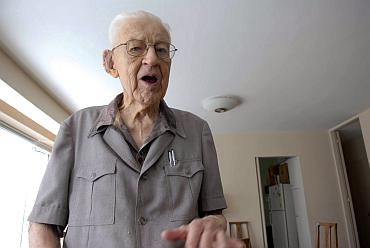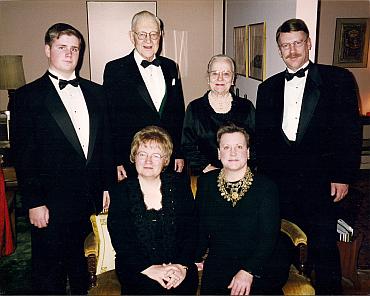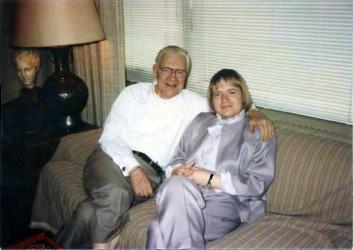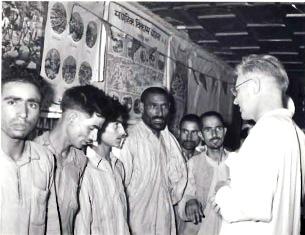Aziz Haniffa in Washington, DC
Nancy Talbot, daughter of the late Phillips Talbot, who passed away October 1, is an ordained Presbyterian minister. She is associate director, spirituality programs, Bellevue Hospital, New York City, where she meets with patients to talk about how they can use spirituality to cope with their illnesses.
When she starts reminiscing about her childhood years and the several trips she made to India with her father, she is filled with a palpable sense of nostalgia, and the kind of spontaneity and excitement that permeate the lives of children.
Nancy first accompanied her parents to India when she was seven in 1956, when her dad went over as the director of the American University Field Staff.

"We spent a year traveling throughout India and Pakistan. We moved every six weeks for a year so that he could talk with people about what was happening politically, economically, culturally and socially so that he could write reports back to the universities."
The Talbots--Nancy's mother Mildred Fisher, who died in June 2004, elder sister Susan Talbot Jacox, and younger brother Bruce Kenneth Talbot, who is deceased--traveled with Phillips.
"We went back again in 1960 and my parents decided rather than moving so much--at least during our school year--to stay in New Delhi. They put my sister and me into the Modern School. I now run into a lot of people from New Delhi who went to the same school and are now in leadership positions in India."
'We lived as Indians would do'
Image: Phillips Talbot with his wife Mildred Fisher"My recollection as a child was that most of the friends coming through our home were Indians. We lived as much as possible as Indians would do, eating Indian food, having Indian friends and going to an Indian school. At this time I was 11, and my sister was 15. My brother was with us during this time. Since he was younger and the courses in his age group were still being taught in Hindi, they had to put him in the American school."
It was during their second time around in India that her father got the call to come to Washington as Assistant Secretary of State for Near East and South Asian Affairs.

"When we had to come back to the US because my father joined the Kennedy administration, my sister, who was older, wanted to stay in India and finish the school year, and so, she lived with the headmaster of Modern School M N Kapur and his family in their home," she said.
What she most appreciated about her parents, Nancy said, was that during the time in India, "they wanted us to have a full experience of the country," and bemoaned that "many Americans, when they go overseas, tend to live and make friends with other Americans and live within the community," in a cocoon.My father always pined for India'
Image: Grandson David Franklin Jacox, Phillips Talbot, wife Mildred, son Bruce, (seated) Susan and NancyNancy acknowledged that over the years, throughout his career as a diplomat and senior official, her father would always reminisce about India and in some ways pine for India.
"He had many Indian friends and whenever they came to wherever we lived, they would visit him. Whenever, we had the opportunity to go back to India, he was most happy to do so. He visited as many friends as possible and kept up with what was going on in India."
She spoke of how her father was an avid reader of India Abroad and would enjoy his interactions with its founder-editor Gopal Raju, who would invite him to all major events.

Nancy said her father, who worked in India as an Associated Press correspondent and was witness to Partition, would talk of how painful Partition was and the impact it had on his psyche.
"At the end of his life, in these last several years from the time he got the Padma Shri [one of India's civilian honours], a lot of his focus was again on India. As he took out the letters he had written and published them as a book, it was cause for him to talk a lot about Partition."'Father spoke about the devastation caused by Partition'
Image: Talbot with daughter NancyNancy said he recalled how at a train station there had been a massacre and he was one of the people who helped take the dead bodies off the train.
"This was not just a journalistic exercise for him. He had become quite engaged and involved with this country over a long period of time and he was in the midst of experiencing what other people were experiencing as he was reporting on it."

"Our home was always decorated with Indian items," she said, and then giggling with child-like excitement, she spoke of how "when we were there in 1956-1957, my mother had my sister and me learn Bharata Natyam and bought us outfits and everything so that when we came back to this country, we spent time-- my sister and me-- giving dance concerts at our schools and our church and at all the places where people had not had the opportunity to know anything about India. And, mind you, this was only nine years after [India's] independence!"
"Here were these two young American girls, who were cultural ambassadors for India, if you will," she said with a chuckle.
'Dad was very open to other people's religions'
Image: Phillips Talbot speaks to Indian farmers"She created several NGOs. She was a representative to NGOs affiliated with the UN for a very long time, and she had a wide variety of interests that she pursued over time. She was also president of the National Council of Women."
Nancy also spoke of how religious her father was.

"He believed very deeply in God and went to church every week. His religion was very important to him. At the same time, he was very open to other people's religions. When he was in India, he was very interested in getting to understand Hinduism, to understand about the Muslims and Islam, and also Zoroastrianism, Buddhism, Sikhism. Later in his life, when he became president of the Asia Society, that extended into China and into understanding Confucianism and Taoism and all these other kinds of understandings and beliefs, while he remained centered in his own faith belief-- his own religion."






article